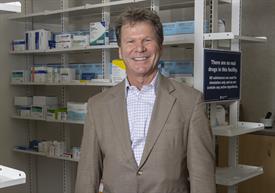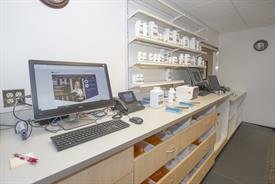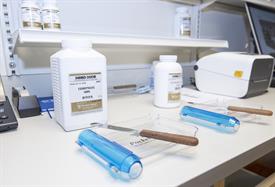Schoolcraft College’s two-year-old Pharmacy Technician program has met high national standards to earn accreditation by the Pharmacy Technician Accreditation Commission, a collaboration between the American Society of Health System Pharmacists and the Accreditation Council for Pharmacy Education.
Achieving this important status as an accredited program confirms that students who graduate from the Schoolcraft College pharmacy technician program will obtain critical skills needed to succeed in any pharmacy work environment. Students who enroll in the Schoolcraft College Pharmacy Technician program can complete all requirements to enter the workforce in as little as one semester.
Schoolcraft College’s Training Approach
 ”Pharmacy technicians prepare and dispense medications under the supervision of pharmacists in either a community setting, which includes drugstores, or in an institutional setting, which includes hospitals or long-term care pharmacies,” said Joseph Ringer, Program Coordinator, Pharmacy Technician Program (pictured). Ringer, who is both a licensed pharmacist and holds a Master of Business Administration, describes the program as one designed with the success of the student in mind.
”Pharmacy technicians prepare and dispense medications under the supervision of pharmacists in either a community setting, which includes drugstores, or in an institutional setting, which includes hospitals or long-term care pharmacies,” said Joseph Ringer, Program Coordinator, Pharmacy Technician Program (pictured). Ringer, who is both a licensed pharmacist and holds a Master of Business Administration, describes the program as one designed with the success of the student in mind.
“Our simulation environments are state-of-the-art,” Ringer said. “The drugstore side of our simulation lab is modeled after leading chain pharmacies, such as CVS, Walgreens and Meijer; the hospital side of the simulation lab is modeled after hospital clean rooms and is aligned with the most up-to-date standards for making intravenous solutions. Our students use simulation drugs and intravenous solutions to learn how to prepare and dispense medications as if they were in the actual work setting.”
Christine Hinkle, a 2020 graduate of the program, said that the simulation lab was particularly helpful.
“The simulation lab was great” she said. “We used real simulated medications to learn how to do things like making multiple bags of intravenous medications at the same time, which is just like we were really working in the hospital environment.”
Bria Myers, also a 2020 graduate of the program, echoed Hinkle’s endorsement.
“The simulation lab was one of the best hands-on education experiences I’ve had,” she said. “With retail on one side and the hospital on the other side, the simulation lab was just like the real world.”
 Students learn from experienced pharmacy professionals. All instructors for the lecture portion of the curriculum are licensed pharmacists.
Students learn from experienced pharmacy professionals. All instructors for the lecture portion of the curriculum are licensed pharmacists.
“Professors were great and enthusiastic with the ability to get us to learn, and would use games, such as bingo, to help us learn pharmacology and drug names,” Hinkle said. Hands-on activities in the simulation lab are taught by certified, licensed pharmacy technicians who provide students with guidance on making and dispensing medications.
“The techs were so understanding and explained things several times until we got it,” Myers said. “Our lab technicians taught real-life, hands-on experiences that we took to our new job.”
Said Elliott Riker, also a 2020 graduate of the program: “Having pharmacists as instructors and experienced technicians teaching me gave me a perspective on what the job was actually like.”
Teaching those real-world scenarios is at the heart of Schoolcraft College’s program.
“This caliber of instructors and simulation lab technicians means that when students have a question, they get an explanation based on real-world experience,” Ringer said. “Also, we strive to maintain a 5:1 student-teacher ratio in our simulation lab, so students can get the attention that they want and deserve.”
Myers said, “With the smaller class size, I got to know my fellow students better, engaged in more discussions and got to know the materials better.”
Preparing Students for Success After Graduation
Concurrent with learning required pharmacy skills in the simulation lab, students are also placed in an actual practice setting with partner employers. These partner employers include major chain pharmacies, such as CVS, Walgreens and Meijer as well as hospital systems, such as Beaumont Health, Saint Joseph Mercy Health System and Garden City Hospital.
Ringer has a strong relationship with his program’s Advisory Board, which includes leaders from all of these partner employers. “By listening to pharmacy leaders on our Advisory Board, we were able to create a robust Pharmacy Technician program that meets the needs of each of these employers,” he said.
 One student was impressed with how closely the curriculum aligned with the pharmacy technician certification exam, allowing this student to pass the exam after graduation from the program in May 2020. Other 2020 graduates are planning to take their certification exam in the coming months. All students in the first graduating class of 2019 passed the pharmacy technician certification exam on their first attempt.
One student was impressed with how closely the curriculum aligned with the pharmacy technician certification exam, allowing this student to pass the exam after graduation from the program in May 2020. Other 2020 graduates are planning to take their certification exam in the coming months. All students in the first graduating class of 2019 passed the pharmacy technician certification exam on their first attempt.
“We prepare students with the skills that they need and then prepare them to become Reality Ready™ for the workforce by assisting with their resumes and interviewing techniques,” Ringer said. These connections, combined with Schoolcraft College’s strong program, have helped students get jobs right after graduation.
“Practicals were very helpful and prepared me to step right into a job,” Riker said. “I even got a job offer before classes were over from the place where I was taking my practicals!”
“The amount of vacancies for pharmacy technicians is significant, with most pharmacies needing to fill open positions,” Ringer said. “I get calls all the time from community or hospital pharmacy directors looking for my students, and employers are very positive on the quality of our students.”
The Pharmacy Technician program is currently housed in a dedicated facility at Radcliff Center and will move to the new Health Sciences building on the main campus within the next two years. The facility in Health Sciences also will include a chemotherapy room for training to prepare cancer drugs.
Additional Program Information
The new accreditation standards set up two levels of pharmacy technicians – entry-level and advanced-level. An entry level technician is formally trained in one pharmacy setting, either a drug store or hospital, while an advanced level technician receives training in more than one pharmacy setting.
Schoolcraft College’s program is accredited for both, which allows students to prepare for future-oriented roles that will be taken on by pharmacy technicians.
“Resources were made available, including articles to read, that made me think about my potential as a pharmacy technician beyond routine roles,” Hinkle said. “I always felt supported and never felt like I had to do things on my own.”
How healthcare is changing
Ringer believes that pharmacy technicians will play an even greater role in the healthcare field going forward.
“Right now, patients rely on pharmacists more than ever – they really are on the front lines helping people understand their medications,” Ringer said. “This, in turn, means it’s important to have skilled, trained pharmacy technicians to support the pharmacists.”
Ringer said that in the future patients with chronic diseases will move into the community setting. “Pharmacists will manage those patients, leaving almost all of the processes for filling prescriptions and preparing medications to the pharmacy technicians,” he said. “The Schoolcraft College program was designed with this future pharmacy environment in mind.”